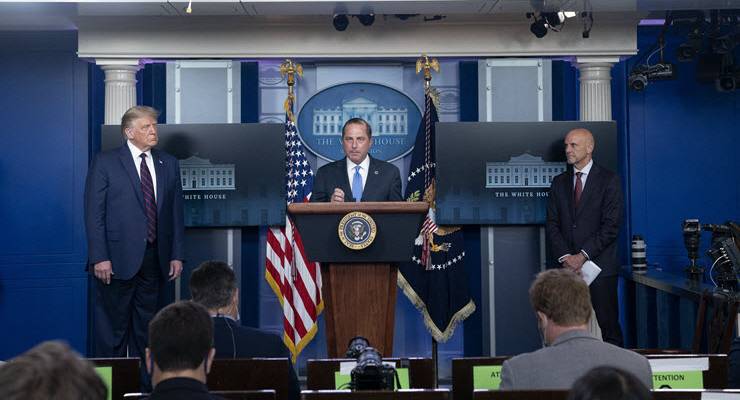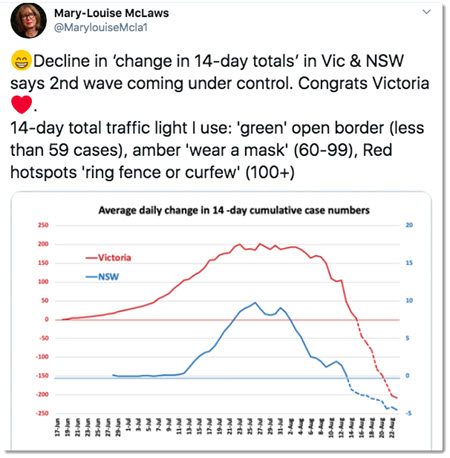
Queensland tightens restrictions
Contact tracers in Queensland have been working furiously to extinguish a cluster linked to the Brisbane Youth Detention Centre. Overnight, the state recorded just one new case, a close contact of a worker at the centre.
But health authorities are still urging caution — 55 locations across greater Brisbane have been listed as venues where infected people visited. And the state government tightened restrictions slightly over the weekend, by limiting private gatherings in the Brisbane area to 10 people.
NSW, Victoria getting under control
Numbers in NSW and Victoria continue to look positive. According to UNSW epidemiology professor Mary-Louise McLaws, there’s been a fall in 14-day cumulative case numbers in both states that suggests the second wave could be coming under control.

With Victoria now more than halfway through stage four restrictions, the state recorded 116 new cases overnight, the lowest figure since early July. Today’s numbers also mean the seven-day average in Victoria has fallen below 200 for the first time in over a month.
There were three new cases in NSW recorded overnight.
On Saturday, a crew member on the set of The Masked Singer, which was allowed to continue filming in Melbourne, tested positive for COVID-19. That show and Millionaire Hot Seat, also filming at Docklands Studios, have shut down, and forced cast and crew into two weeks’ isolation.
Parliament returns
After a long winter hibernation, extended by the Victorian outbreak, federal Parliament returns, but not as we know it. Many MPs will be masked, others won’t even be in Canberra, video conferencing in from the security of their electorate offices.
Top of the agenda will be plans to extend JobKeeper and JobSeeker through till next March, albeit at reduced rates. Labor is expected to push for the payments to stay at the same rate.
But as those payments are set to be reduced, Treasurer Josh Frydenberg has struck an optimistic note, arguing that the Australian economy is bouncing back and pointing to figures which show 700,000 of the 1.3 million Australians who lost their jobs during the pandemic are back at work.
FDA backs plasma
The United States’ Food and Drug Administration (FDA) has granted emergency approval for blood plasma as a potential coronavirus treatment, a day after the agency was attacked by President Donald Trump.
The announcement gives “emergency use authorisation” for plasma from people who have recovered from COVID-19 to be used to treat the virus, pointing to early results that showed it improved health and decreased mortality.
But so far, there is only preliminary data on plasma’s effectiveness, and no randomised control trials, which give the clearest results. Last week, the roll out of blood plasma as a treatment stalled following intervention from top scientists. The FDA’s recent decision comes just a day after Trump hit out at the agency, which he referred to as the “Deep State”, for slowing the roll out of vaccines.
Spikes and restrictions return
South Korea was a global success story in managing the pandemic in its early months. But on Sunday, the country recorded 397 new cases, the largest daily increase since March, and the 10th consecutive day of cases in the triple digits. The country is shutting down bars, clubs, churches and other large gatherings.
Meanwhile Germany, another early stand-out performer, has seen its biggest spike since April. In Italy, one of the worst-affected countries in Europe in the first wave, recorded more than 1000 cases in 24 hours for the first time since May.








Disappointing that Crikey parrots Frydenberg without pointing out that the jobs that have been regained are mostly casual or part time or both. The economy is bouncing back exactly as the coalition would want – more casuals, more leverage for the mates to destroy working conditions for more people. This government despises everyone who isn’t a mate.
Pity there isn’t anything interesting happening in the country or world that might inform an “article” that wasn’t vapid stenography.
Perhaps this is why the comments system has been banjaxed – how soon before it is abolished?